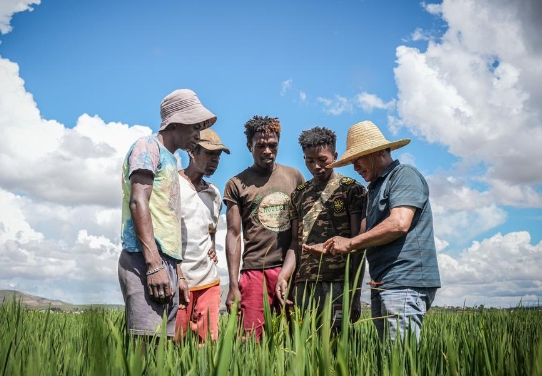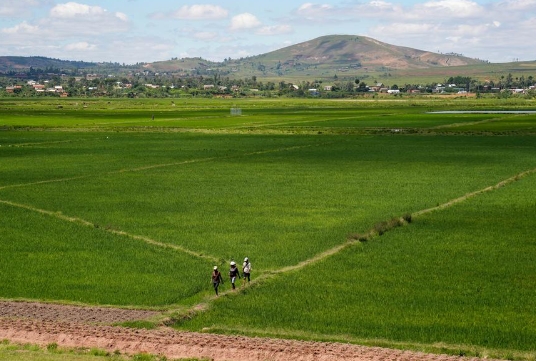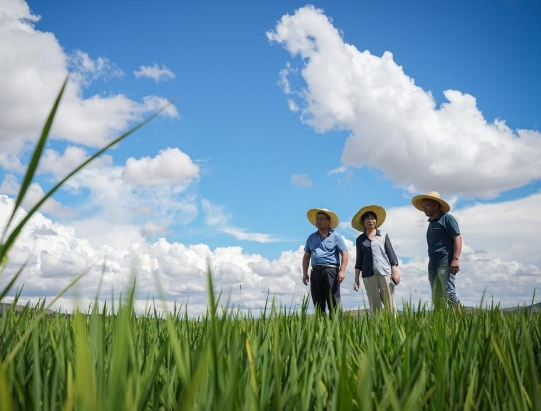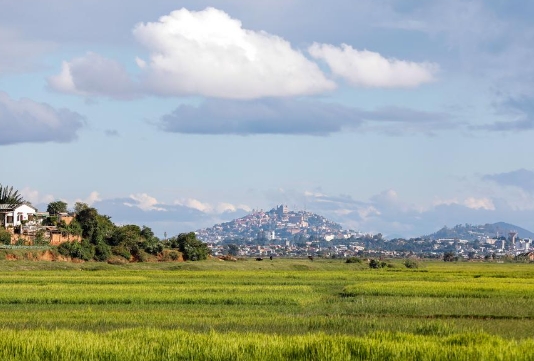Sowing seeds of hope -- Chinese agronomist's 18-year dedication to Madagascar's rice dream

Chinese agronomist Hu Yuefang (1st R) inspects hybrid rice growth with local farmers in Mahitsy, Madagascar, on March 25, 2025. (Xinhua/Li Yahui)
To date, hybrid rice cultivation in Madagascar has reached a cumulative 90,000 hectares, with average yields of 7.5 tons per hectare -- two to three times that of local varieties, making it Africa's largest hybrid rice producer by area.
As usual, 67-year-old Chinese agronomist Hu Yuefang started his day at dawn, donning a wide-brimmed hat and draping a towel over his shoulders. Barefooted and with trousers rolled up, he waded into the muddy paddies, inspecting the crop alongside local farmers.
These emerald rice fields stretched across Mahitsy, a town about 35 km northwest of Antananarivo, the capital of Madagascar. At the town's heart lies the China Hybrid Rice High-Yield Demonstration Base, where rows of lush stalks swayed in the breeze, forming a vibrant patchwork across the countryside.
Hu, hailing from China's rice-rich Hunan Province, arrived in Madagascar in 2007, when China launched its hybrid rice demonstration center project on this island. He has since spent 18 years cultivating what he calls "rice-growing life."
Together with fellow Chinese agricultural experts, Hu devotes himself to introducing high-yield hybrid varieties, promoting modern farming techniques, and training local farmers.
Their efforts have contributed significantly to Madagascar's pursuit of food security. To date, hybrid rice cultivation in Madagascar has expanded to a cumulative 90,000 hectares.
CULTIVATING SEEDS
"To promote the hybrid rice here, we first had to find seeds that suited Madagascar's climate," Hu recalled.
The island's diverse terrain -- from rainforests and swamps to semi-arid zones and volcanic soils -- posed a daunting challenge, even for a veteran expert like Hu. Armed with dozens of seed samples, Hu and his team embarked on a journey across nearly all major rice-growing regions.
"After years of trials, we bred five high-yielding varieties suited to local conditions -- resistant to drought, floods and lodging," he said. "But the harder task was to convince farmers of these 'foreign' seeds."

Farmers walk along the ridges of hybrid rice paddies in Mahitsy, Madagascar, on March 26, 2025. (Xinhua/Li Yahui)
To prove the benefits, they planted side-by-side demonstration plots -- one with local rice, the other with hybrid. With the same cultivation methods, the yield of hybrid rice is two to three times that of local varieties. Impressed by the results, farmers affectionately dubbed it "Tsarabe" -- the best thing in Malagasy.
Progress was hard-won. Hu recalled living in leaky thatched huts, collecting rainwater to drink, and trekking miles for firewood. "Once, while transforming a swampland, a tree branch pierced my foot. It was the villagers who carried me out," he said.
The efforts paid off. "Before, our land barely produced enough to feed us. Now, with hybrid rice, we not only eat our fill, but sell the surplus and even save to buy more land," said 30-year-old farmer Femosoa Rakatondratsara, beaming beside his blossoming field.
To date, hybrid rice cultivation in Madagascar has reached a cumulative 90,000 hectares, with average yields of 7.5 tons per hectare -- two to three times that of local varieties, making it Africa's largest hybrid rice producer by area.
SPREADING KNOW-HOW
"Good seeds aren't enough. Farmers must know how to grow them," Hu said.
From sowing and transplanting to pest control, he demonstrated every step of the rice production process to farmers. "When farmers face problems nearby, I ride over on my motorbike. If they're far, I help them over the phone," he said.
Over the years, he has trained so many farmers that he lost count, but the calls of "Teacher Hu" echoing from the fields remain his most cherished memory.

Chinese agricultural experts view the growth of hybrid rice in Mahitsy, Madagascar, on March 25, 2025. (Xinhua/Li Yahui)
Years of fieldwork have left Hu deeply tanned, making his face under a straw hat indistinguishable from the locals. Determined to better communicate with farmers, he has been learning Malagasy for three years.
Beyond practical teaching, Hu and his colleagues also offer regular sessions at the Center for Professional Training in Agriculture in Mahitsy, training local technicians who share their knowledge with more farmers.
So far, Chinese experts have conducted hundreds of training sessions, directly reaching over 2,000 people and indirectly benefiting tens of thousands more. "We're working to build a national training platform to spread hybrid rice technologies even further," Hu said.
"We express our gratitude to the Chinese government for this cooperation in hybrid rice, through the sending of experts who share a wealth of knowledge with us," Michel Anondraka, director general of agriculture and livestock at Madagascar's Ministry of Agriculture and Livestock. "Hybrid rice is a high-yield variety and increasing its production will ensure Madagascar's rice self-sufficiency."
LIFELONG COMMITMENT
"Hybrid rice is my lifelong commitment," Hu said, his steady gaze fixed on the lush, green paddies that stretched before him.
"There were times I thought of going home. It's not easy spending years in a foreign land, working tirelessly," he said. Many colleagues came and left, but Hu stayed. "Once I decide on something, I stick with it."

This photo taken on March 25, 2025 shows hybrid rice fields in Anosiarivo, Madagascar. (Xinhua/Li Yahui)
For Hu, his mission has been clear: to breed successful local hybrids, establish a high-yield demonstration base, and localize seed production. With the first two milestones achieved, his focus now shifts to the third, collaborating with the Chinese firm Yuan's Madagascar Agricultural Development.
Hu attributes his persistence to two profound beliefs: ensuring that farmers never go hungry and realizing the vision of Yuan Longping, the late "Father of Hybrid Rice," who dreamed of spreading hybrid rice worldwide. "He told me to make this succeed in Madagascar," Hu said.
However, such unwavering dedication has come at a personal cost. His annual trip home is his sole chance to reunite with family. He has missed out on moments both somber and joyous, including a final farewell to his mother and the birth of his grandson. Despite the sacrifices, Hu remains resolute.
He hopes to return home for good in two or three years, "but only when my two apprentices can carry on," he said. "By then, I'll be nearly 70. But I believe the fragrance of these rice fields will be passed on, generation after generation."
Editor:伏娅敏
